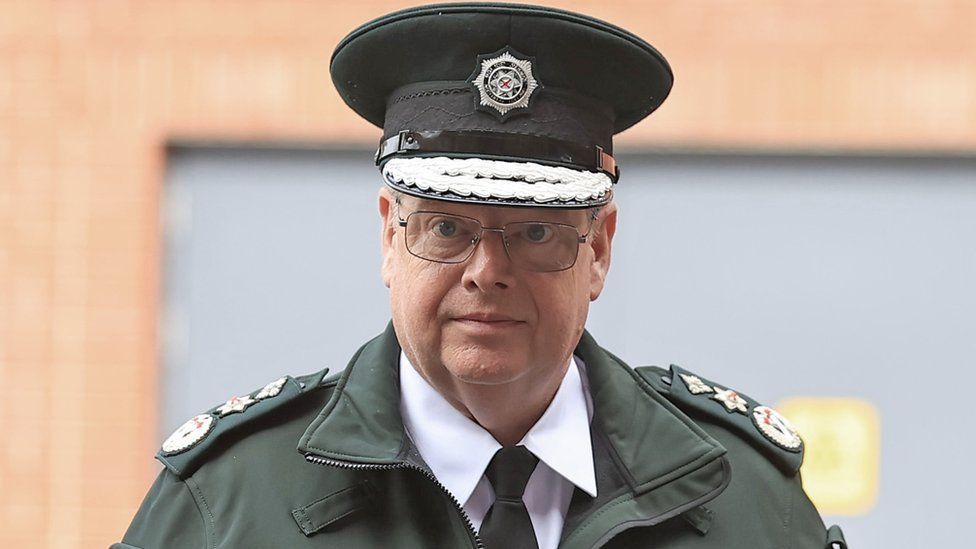
Simon Byrne has faced a number of controversies in recent weeks
Simon Byrne has resigned as chief constable of the Police Service of Northern Ireland (PSNI) with immediate effect.
Policing Board members accepted his resignation on Monday, four years after he was appointed to Northern Ireland’s top policing job.
In a statement, Mr Byrne said it was “now time for someone new to lead this proud and resolute organisation”.
Pressure had been mounting on Mr Byrne following a number of controversies.
The event was marking the anniversary of the 1992 Sean Graham bookmakers attack where five people were murdered by loyalist paramilitaries.
The judge said the officers were disciplined to allay any threat of Sinn Féin abandoning its support for policing in Northern Ireland. Sinn Féin has denied this.
Mr Byrne said he was considering an appeal against the ruling.
Last month a number of data breaches came to light, including one where the names and details of the PSNI’s 10,000 officers and civilian staff were published in error as part of a Freedom of Information request.
‘Fear and uncertainty’
Mr Byrne later said the information was in the hands of dissident republicans, who could use the list to generate “fear and uncertainty”.
Some of the information included the rank or grade of employees, where they are based and the unit in which they work.
This led to some staff saying they fear for their safety due to continuing threats from paramilitaries.
An independent-led review is due to be carried out into the breaches.
PSNI chief Simon Byrne’s resignation explained in 135 seconds
Mr Byrne had ruled out resigning following an emergency meeting of the Policing Board last Thursday that lasted almost seven hours.
This prompted the Democratic Unionist Party (DUP) to submit a motion of no confidence in him.
Other unionist parties had called for the chief constable to go, while several parties raised questions about the PSNI leadership.
‘Irreparably shattered’
DUP leader Sir Jeffrey Donaldson said Mr Byrne’s resignation was “the right thing to do” under the circumstances.
He said his party would work with the Policing Board to deliver effective policing in a “way which commands cross-community support”.
Speaking in the House of Commons, Northern Ireland Secretary Chris Heaton-Harris thanked the chief constable for his “many years of public service”.
He indicated that he will bring forward legislation to allow him to appoint a new PSNI chief if the power vacuum at Stormont continues.
There has been no functioning executive since February 2022 after the DUP withdrew from devolved government in protest over post-Brexit trade arrangements.
Sinn Féin assembly member and Policing Board member Gerry Kelly said a new chief constable would allow for an opportunity to focus on a police service that “has the confidence of the entire community”.
Alliance’s Nuala McAllister, who is also on the Policing Board, said “fundamental challenges” facing policing in NI have not gone away, and that the party’s concerns do not “begin and end with one individual”.
Ulster Unionist Party (UUP) leader Doug Beattie said Mr Byrne had “done the right thing but this was never about just one man”.
The announcement was made in a statement by the chair of the Policing Board, Deirdre Toner
Social Democratic and Labour Party (SDLP) leader Colum Eastwood said confidence in Mr Byrne had been “irreparably shattered”, and questions over his tenure had become a distraction within the PSNI.
Rank-and-file police officers union the Police Federation for Northern Ireland welcomed Mr Byrne’s resignation.
Successor ‘has mountain to climb’
Its chairman, Liam Kelly, said morale among officers had never been lower and warned that Mr Byrne’s successor “has a mountain to climb to address the cultural deficiencies, rebuild confidence and restore credibility” in the PSNI.
Traditional Unionist Voice (TUV) leader Jim Allister said Mr Byrne leaves behind a “demoralised and politically compromised PSNI”, and said the organisation’s top priority is its “political decontamination”.
Northern Ireland’s Policing Board is a public body made up of 10 political and nine independent members.
It holds the chief constable to account for the delivery of policing.
Speaking to the media on Monday, its chair Deirdre Toner described Mr Byrne as a “dedicated police officer with a deep respect for the profession of policing”.
“His tenure was subjected to intense scrutiny and I am sure the last few weeks in particular have been incredibly difficult for him personally and professionally,” she added.
Just months after securing a three-year extension to his contract, Simon Byrne is out of a job.
In the end he ran out of allies and was left with no option but to quit.
The prospect of losing a vote of confidence from the rank and file officers in the PSNI tipped the balance.
To avoid that humiliation Simon Byrne, spent the weekend planning his exit.
It is unclear as to whether he will receive any cash settlement after walking away from a £230,000-a-year job.
There is a “contractual” procedure which is now under way, according Policing Board chair Deidre Toner.
Questions also remain as to who now will take charge in the interim while successor is found.
The next in line, deputy chief constable Mark Hamilton, has also been damaged by last week’s court ruling.
He too faced calls from unionist parties to resign.
Given the many challenges the PSNI faces, the board will want to move quickly to fill the new vacancy.








